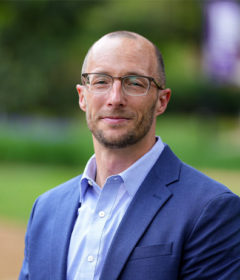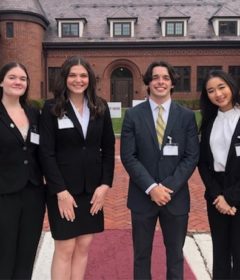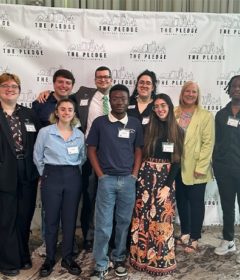A Call from Opera Superstar Plácido Domingo
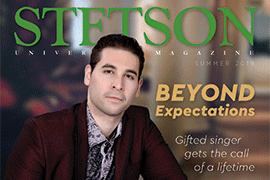

Music student Kevin Romero was heading to the movies with a few friends one weekend in April 2018 when his phone rang and he noticed it was a Los Angeles number.
Dominic Domingo, grandson of opera star Plácido Domingo, introduced himself and said he was in charge of the Young Artist Program for the Los Angeles Opera. Plácido Domingo wanted Romero to fly out and audition for the program.
“I’m like, ah, I mean, when? I’m still in school. I’m in the middle of Stetson. I have like a class tomorrow,” recalled Romero, an aspiring opera singer at that time and a junior majoring in vocal performance. “And he’s like, OK, just wait a second.
“And he passes the phone, and it’s Plácido Domingo. And Plácido Domingo comes and talks to me, and I’m, Oh, my God. Don’t even ask me what I said, because I was just, ‘Oh, OK, maestro.’”
Romero grew up listening to Plácido Domingo and only a few months earlier had entered his world opera competition for young singers, called Operalia. Romero had received an email, saying he had been selected for the competition in Lisbon, Portugal.
But Plácido Domingo wasn’t calling about that. He wanted Romero to audition for the Young Artist Program for the LA Opera. Domingo is LA Opera’s general director.
“He pretty much said, ‘Hey, we need a tenor for our program. I looked at your videos, and it’s very impressive, your voice for such a young age.’ I had just turned 22,” Romero remembered. “And he said, ‘Why don’t you come next week to LA and audition for us, and we’ll fly you here?’”
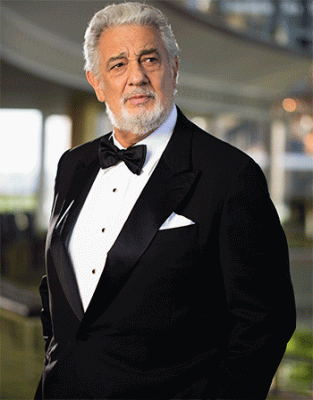
Photo courtesy: LA Opera
The selection process for the coveted program usually is very competitive. Last year, out of 650 applicants, 200 were invited for live auditions. From these, a final field of 28 candidates emerged — and ultimately five singers were selected.
For Romero, it was an incredible invitation.
“In some ways, I was so surprised and in other ways, it made complete sense to me,” said Timothy Peter, D.M.A., dean of Stetson’s School of Music. “Kevin’s charisma, natural talent and openness to growth as a singer made him the perfect candidate for this opportunity.”
Romero would later learn his big break stemmed from a chance encounter. Plácido Domingo happened to walk by the desk of a staff member who was listening to Romero’s audition video for Operalia.
“And so just like that, in one week, I mean literally, we’re talking about the middle of the semester, I was worrying about the recital that I had to do at Stetson and multiple-choice exams, and out of nowhere I have Plácido Domingo saying come next week to LA,” Romero said.
“NO MATTER WHAT, YOU NEED TO DO IT”
As soon as Romero hung up with Domingo, he immediately phoned Stetson Voice Professor Jane Christeson. An opera singer herself who has performed around the world, Christeson had trained Romero for two years in her studio in Presser Hall on campus, teaching voice and music literature and helping with his diction in five languages.
“I told her everything,” Romero said. “She’s like, ‘You need to do it. No matter what, you need to do it She was super supportive, and I was so scared. You have to think about all the emotions and all the decisions that I had to make at that time. Am I even ready to do this? Should I go out there? The people who are going to hear you have a lot of influence on a career, and you definitely don’t want to make a fool out of yourself.”
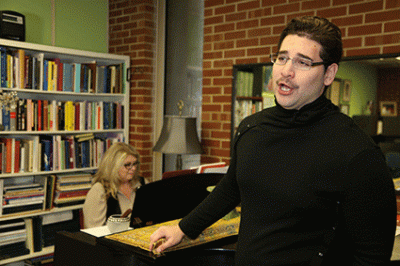
Christeson remembered her reaction: “He called me that night, ‘Whoooaaaaa.’ I’m just like, my mind is blown.”
“The way this happened is almost like the story of the starlet sitting at a soda-fountain counter, and somebody coming up and saying, ‘I’ll make you a star.’ That’s literally the type of ridiculous good luck that this was,” she added.
Romero had planned on applying for these premiere young artist programs across the country, but not until he graduated from Stetson. The programs offer paid residencies and a chance to train with the biggest names in opera, including at places such as the Lindemann Young Artist Development Program at The Metropolitan Opera in New York City or the Houston Grand Opera Studio.
“LA has always been number one, top of my list,” Romero said. “I wanted to go there because that’s where Plácido Domingo is.”
Romero’s father, Jorge, worked as a salesman while he was growing up and was a talented singer on the side, performing at weddings and other events. The family is from Argentina and moved to Florida when Kevin was 6. Kevin says he inherited all his talent from his father and remembers their home was filled with music — often Plácido Domingo and the Three Tenors, the popular trio of Domingo, Luciano Pavarotti and José Carreras.
Today, Domingo stands in a class of his own, according to The New York Times. In August 2018, at age 77, he sang his 150th role — “a virtually unheard-of milestone in opera history,” the Times reported.
In a career spanning six decades, he has performed more than 4,000 times and continues to sing and conduct around the world.
For Professor Christeson, to have a world-renowned star like Domingo take a personal interest in Romero was an opportunity that he had to pursue, even if Domingo wanted him to start in August 2018, before he graduated.
“Domingo took him and said to him, one on one, if you come and work here and coach with me, study with me, in three years, you will be singing all over the world. And when somebody with the connections and the global reputation and contacts that Domingo has, he can make that happen,” Christeson said.
“He can open doors for him. Now, he can’t, if Kevin doesn’t sing well; he can’t get him the job, but he can get him to sing for people, and he can recommend him to anybody in this business in existence today. And that, you just can’t pass that up.”
“I WAS SO NERVOUS”
Romero flew with his parents to Los Angeles for the audition on April 15, 2018, and he was well-prepared, having rehearsed and rehearsed again his selection of songs. While a college student, he had tried out for opera roles in production companies around Florida, and he knew what to expect.
Plácido Domingo would be there and probably two or three other people, he thought. After a tour of the LA Opera’s home in the Dorothy Chandler Pavilion in downtown Los Angeles, Dominic Domingo told him to get ready for the audition.
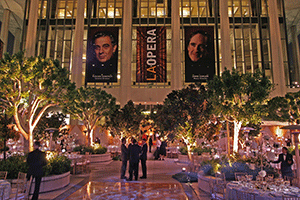
“I go to the audition room, and there’s like 25 people there,” Romero described. “We’re talking about the main director of LA Opera. Plácido Domingo obviously is there, greeting me. Susan Graham is there because she’s the artistic adviser. I mean, Susan Graham, we’re talking about one of the most renowned mezzo-sopranos in the world. She’s sung everywhere. We have Dominic Domingo there, as well — everybody involved in all the coaching.
“I was so nervous, and so I get up there and the first thing I say is, ‘I want to express my gratitude for flying me from Florida to LA, giving me this hospitality, giving me this wonderful opportunity.’ And I start singing the first song that I was going to sing. But [Plácido] Domingo actually changed it. He was like, ‘No, no, no. I want to hear something else.’”
Romero’s well-rehearsed game plan was ruined, he recalled with a laugh. Instead, Plácido Domingo asked him to sing certain selections, maybe four songs.
“And right then and there, Domingo said, ‘I like the voice. I think you should come and work with us. And I think there’s still a lot of things you can improve on. And I think you’re going to be a good fit here.’ And right then and there, they took me for the program,” Romero said.
A press release from the LA Opera announced the selections for the Domingo-Colburn-Stein Young Artist Program for the 2018-2019 season, including Romero, four other singers and two pianists. Almost all of them have master’s degrees from places such as Yale, Rice and Boston University.
“Kevin is certainly one of the youngest singers we have had in the program,” said Joshua Winograde, LA Opera’s senior director of Artistic Programs, who oversees the Young Artist Program. “Most of our singers have completed a master’s degree. … While our program is designed to be a transitional step for a student to a professional, the experience can occasionally be tailored to helping along a younger singer of extraordinary talent like Kevin.”
“INCREDIBLE RAW TALENT”
Romero came to Stetson in 2016 as a transfer student from Valencia College in Orlando. And, again, his route was not a traditional one.
Professor Christeson’s husband, Norton, then Choral Voice Department chair at Daytona State College, heard Romero perform at a state competition. Romero didn’t win, but Christeson’s husband took him aside immediately and told him that he should consider attending Stetson University.
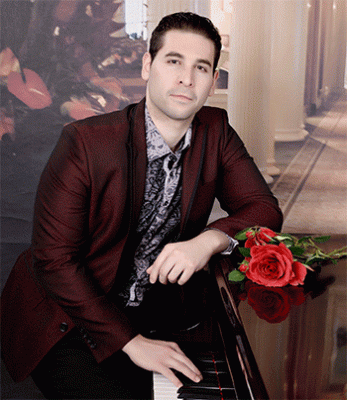
A special audition was arranged in Stetson’s School of Music on a Wednesday afternoon. Romero arrived on crutches with a leg injury. Professor Christeson and two other faculty members listened to him sing in a classroom.
“When he auditioned for us, he already showed that it was this incredible raw talent, just from a vocal range and timbre, color of voice,” Christeson said. “He had already had some good training. His vocal range was evident, good really strong low voice, which also is unusual for a tenor, which also shows you that as he gets older, the voice is going to grow even more and be more solid, top to bottom, with a wide range. All of those factors you can hear in an audition.”
For singers, Christeson explained, the body is the instrument. Singers must possess the right physical vocal ability, as well as musical talent.
“That’s two huge components that go together to spell success,” she said, “and also the work ethic.”
Christeson recalled another Stetson standout, alumnus Donovan Singletary ’06, who was selected for the Lindemann Young Artist Development Program at The Metropolitan Opera House in New York City. When Singletary was a student, Christeson would stop by her studio during Christmas break and find him still there, practicing in Presser Hall.
“Kevin has that type of work ethic,” she added.
Romero entered every competition he could find, attended master classes and made contacts with people in the business. He worked hard on his diction in French and German, although he already knew Spanish, English and Italian, given his Argentinian parents and a mother of Italian descent.
“We’ve had another couple of students who have had incredible vocal talent and ability to be successful,” Christeson continued. “They have not been as mature and had the focused mindset on being as successful at that level as these two guys have, Donovan and Kevin. And they’ve had all the building blocks, but they just haven’t been ready to take the tremendous psychological pressure that it is, the competition and not letting it defeat them.”
“A DREAM COME TRUE”
Most days now, Romero is up early for a run or a workout before leaving his apartment, 15 miles away from downtown Los Angeles. With the traffic, it can take an hour and a half each way, and he arrives early, making sure to warm up fully for the day.
His training schedule may include several coaching sessions on technique, musical phrasing or French diction, followed by rehearsals or group classes in acting or improv. While in Los Angeles, he started using his full birth name, Kevin Jose Simerilla Romero, and he shortens it as a stage name to Jose Simerilla Romero.
With Professor Christeson’s help, he took classes online while in Los Angeles and only has to return to Stetson to perform his senior recital in order to earn his Bachelor of Music degree. He hopes to make time for that over Christmas break this year, and credits Stetson and Christeson with helping him in his career.
“Stetson is a school that’s very high on musicianship. And so I feel that Stetson contributed a lot on that aspect of my career,” Romero said. “Stetson is also such a choir-heavy school, and choir is very focused on phrasing, on clear diction, delivery of the text, which as a singer you can translate that to your own personal technique.
“Being able to phrase a piece of music in such a unique way, to have that skill, I think that definitely puts you ahead of the game. … Stetson definitely helped with that, and it definitely helped with my languages.”
Last summer, before moving to Los Angeles, Romero was invited to perform at Carnegie Hall as part of a master class with renowned mezzo-soprano Joyce DiDonato. He also performed at the Vienna Summer Music Festival and Berlin Opera Academy.
This summer, he is singing with Plácido Domingo in the premier of “Monte Cristo,” a new French opera by composer Frédéric Chaslin, and he will perform at the first 2019 SongStudio at Carnegie Hall in New York with soprano Renée Fleming and tenor Piotr Beczała. Additionally, he will sing at the Aspen Music Festival and then return in August for another season with the LA Opera Young Artist Program.
“It is a whirlwind and actually the first couple months here, it was a bit stressful,” Romero said, referring to taking online classes for Stetson while starting the program. “And at the same time, I also felt like I was playing catch-up because the other young artists who are in this program, I mean, we’re talking about people with years more experience than I have. … All these monster voices, monster talents, who’ve been doing it for years.”
But slowly he has built up a routine, focusing day by day, just trying to do better than he did the day before. The nurturing and professional development by the LA Opera team also have helped.
“I’ve never been so convinced to trust the team that we have here at LA Opera,” said Romero. “They care for all the singers so much that there’s a lot of decision-making and a lot of thought that goes into what you should be singing. It’s always about caring for the voice.”
Best of all, Romero has met the stars of the opera world, rehearsing and working with great singers who once captivated him on his TV at home.
“That’s the craziest thing for me,” he said. “That in such a short amount of time, all this happened, and out of nowhere, I get to meet the biggest names. … It’s just a dream come true. And it hasn’t been a year that I’ve been in LA yet. So, I can’t wait to see what happens next.”
-Cory Lancaster
Stetson Opera Stars Across America
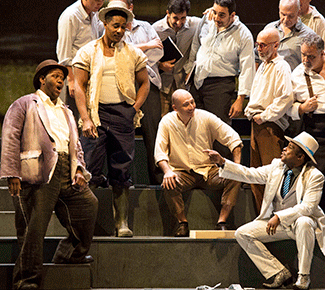
Photo courtesy: Teatro alla Scala
In the coming months, three other opera singers who trained in Stetson’s School of Music will perform on the biggest stages in America.
Donovan Singletary ’06 will perform in the Gershwins’ Porgy and Bess at The Metropolitan Opera in New York City for the 2019-2020 season, which opens in September.
Singletary, a bass-baritone, will star as Jake, a fisherman in the classic story of Catfish Row on the Charleston waterfront. While at Stetson, he trained with Associate Voice Professor Craig Maddox, D.M., and later completed the Met’s three-year Lindemann Young Artist Development Program.
Tenor Edward Washington ’06 will perform in the chorus of Porgy and Bess at the Met. While at Stetson, he trained with Mollie Rich, now-retired from the School of Music.
Tenor Cameo Humes ’06 was offered a contract for the Met production, but had just been hired full-time by Lyric Opera of Chicago. He was a student of Voice Professor Jane Christeson.
“Stetson’s School of Music is known for excellence,” said Timothy Peter, D.M.A., dean of the Stetson School of Music. “We often talk about data and outcomes. Here are some examples of real outcomes that provide ample data which qualifies our claims of excellence. We are proud of all of our alumni and celebrate these successes.”

